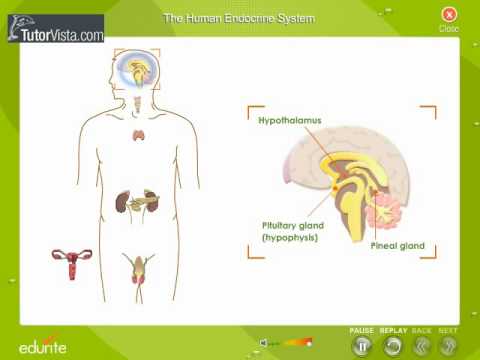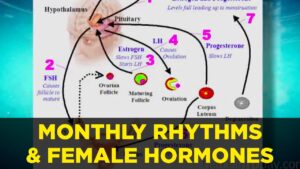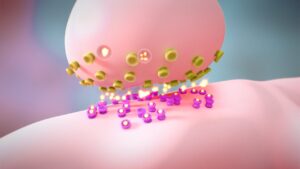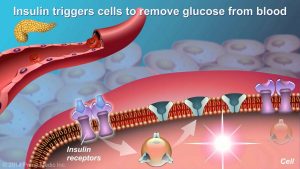Check us out at http://www.tutorvista.com/content/biology/biology-iv/chemical-coordination-animals/endocrine-glands.php The Human Endocrine System Endocrine system is a system of glands, each of which secretes a type of hormone into the bloodstream to regulate the body. The endocrine system is an information signal system like the nervous system. Hormones regulate many functions of an organism, including mood, growth and development, tissue function, and metabolism. The field of study that deals with disorders of endocrine glands is endocrinology, a branch of internal medicine. The endocrine system is made up of a series of ductless glands that produce chemicals called hormones. A number of glands that signal each other in sequence is usually referred to as an axis, for example, the hypothalamic-pituitary-adrenal axis. Typical endocrine glands are the pituitary, thyroid, and adrenal glands. Features of endocrine glands are, in general, their ductless nature, their vascularity, and usually the presence of intracellular vacuoles or granules storing their hormones. In contrast, exocrine glands, such as salivary glands, sweat glands, and glands within the gastrointestinal tract, tend to be much less vascular and have ducts or a hollow lumen. In addition to the specialised endocrine organs mentioned above, many other organs that are part of other body systems, such as the kidney, liver, heart and gonads, have secondary endocrine functions. For example the kidney secretes endocrine hormones such as erythropoietin and renin. Please like our facebook page http://www.facebook.com/tutorvista Follow us at: https://plus.google.com/+tutorvista/

The Human Endocrine System
- Post author:
- Post published:May 5, 2021
- Post category:Uncategorized
- Post comments:0 Comments
You Might Also Like
Diet, Sports Nutrition & Supplementation

How Monthly Rhythms Affect Cortisol & Female Hormones?

Healthy Pregnancy Diet | Parents

What is Palumboism? – Palumboism and HGH/Roid Gut

India’s Best Fish Oil – Omega 3 at CHEMIST SHOP | Cheapest | Guaranteed Results

Nutrition In Pregnancy Video – 1

Special Weight Loss Routine Video – 3

What Should A Diabetic ‘Mom To Be’ Eat? – Pregnancy Tips

Vitamins – What are Vitamins – Types Of Vitamins – Fat Soluble Vitamins – Water Soluble Vitamins

Skiing Video – 3

how to take ECG

Psychosomatic Medicine Video – 2

HEALTH BENEFITS OF FISH OIL

3 Things To Maximize Fat Loss During Ramadan

Introduction to Anatomy & Physiology: Crash Course A&P #1

Fat Loss, Weight Loss Video – 26

Androgen Insensitivity Syndrome

Sedative-Hypnotic-Anxiolytic drugs (pharmacology)

What is Carbohydrate?

Basketball Video – 3

How to Choose a Multivitamin

I Lost My Hair

Omega 3 Fatty Acids के फायदे और नुकसान – Wow, Amway, Healthkart, MuscleBlaze, Healthviva Review

What Vitamin Good For Eyes

“My Gynecomastia Surgery” – Dan Yeomans | Karidis Clinic | My male breast reduction surgery

How to Calculate Your Body Mass Index (BMI)?

Superfoods to Boost Your Metabolism

Ketogenic Diet Xenical

All about Creatine, Creatine side effects | hindi india | Bodybuilding lean muscular body

Keto Diet, Keto Foods, Keto Recipes Video – 7

How to Build Your Upper Chest (NO FLYS | NO PRESSES!)

How to make low budget size gain protein powder at home/how to make protein powder/protein kese bnay

Overweight & Obesity Video – 9

Asanas Meaning And More Asanas Video – 1

Heart Disease Treatment DVD – Bypass surgery – Preview

Neurological Physiotherapy Video – 12

How To: Alternating Floor Oblique Twist w/ Weight

Constipation Nutrition Video – 1

Important Facts About Vitamin K – Best Vitamin K Sources, Types & Its Deficiency

Understanding Type 2 Diabetes

What Is a Super Set? | Gym Workout

